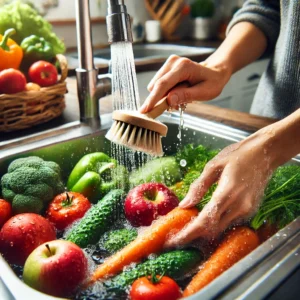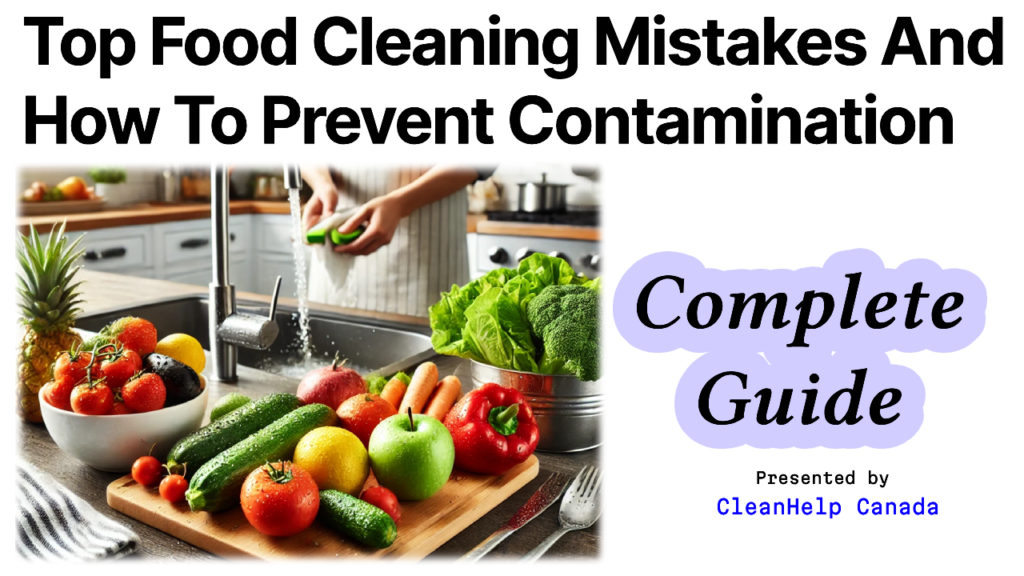Cleaning your food properly is an essential step in maintaining a healthy home and ensuring safe meals for your family. However, many people unknowingly make food cleaning mistakes that can lead to contamination, posing serious health risks. From improperly washing fruits and vegetables to mishandling meat, these small oversights can have big consequences.
At CleanHelp Canada, we know that a clean home is the foundation for a healthy lifestyle. Whether you’re preparing meals in London, Ontario, or anywhere else in the world, avoiding these common food cleaning mistakes is crucial. While professional cleaning services can help maintain a spotless kitchen, it’s equally important to understand how to safely clean and handle your food.
1. Rinsing Instead of Scrubbing Produce

One of the most common food cleaning mistakes is rinsing fruits and vegetables under running water without properly scrubbing them. Many people assume that a quick rinse is enough to remove dirt and bacteria. However, this method often leaves behind harmful pesticides, wax, and bacteria that can lead to contamination.
How to Avoid This Mistake:
- Use a vegetable brush to scrub fruits and vegetables with tougher skins, such as potatoes, cucumbers, and apples.
- For softer items like berries, rinse them gently and dry them with a clean towel or paper towel.
- Avoid using soap or chemical cleaners, as they can leave behind residue that is unsafe for consumption.
By taking the time to scrub and thoroughly clean your produce, you can greatly reduce the risk of bringing harmful bacteria into your home and onto your plate.
2. Washing Meat and Poultry
A widely believed myth is that washing raw meat and poultry helps remove bacteria. However, this is one of the most dangerous food cleaning mistakes you can make. Washing meat under running water can spread harmful bacteria, like salmonella, across your sink, countertops, and nearby surfaces.
How to Avoid This Mistake:
- Do not wash raw meat or poultry. Cooking it at the appropriate temperature will kill any bacteria present.
- If raw meat juices spill on your countertop or sink, clean the area immediately with a disinfectant.
- Always wash your hands thoroughly after handling raw meat to avoid cross-contamination.
3. Neglecting to Wash Hands and Surfaces
Cross-contamination is a significant risk in the kitchen when hands and surfaces aren’t cleaned properly. Many people forget to wash their hands before and after handling food or fail to clean countertops and cutting boards between tasks. This leads to the transfer of bacteria from one food item to another, increasing the chance of contamination.
How to Avoid This Mistake:
- Always wash your hands with warm water and soap for at least 20 seconds before and after handling food.
- Disinfect cutting boards, knives, and countertops after each use, especially when preparing raw meat or fish.
- Use separate cutting boards for raw meat and fresh produce to prevent cross-contamination.
By keeping your hands and surfaces clean, you create a safer cooking environment and reduce the risk of foodborne illnesses.
4. Not Storing Food Correctly
Proper storage is just as important as proper washing when it comes to avoiding food contamination. Many people don’t realize that improper storage, even after washing food, can lead to the growth of bacteria and mold. Storing different types of food together, or leaving items at the wrong temperature, increases the risk of contamination.
How to Avoid This Mistake:
- Store fruits and vegetables in the refrigerator if possible, except for items like tomatoes and onions, which fare better at room temperature.
- Keep raw meat and produce separate in the fridge to avoid cross-contamination.
- Use clean containers and dry produce before storing to prevent mold growth.
At CleanHelp Canada, we understand the importance of maintaining a clean and organized kitchen. Our quality cleaning services can help you keep your kitchen surfaces spotless and safe, reducing the risk of cross-contamination in your home.
5. Ignoring Expiry Dates

Ignoring the expiry dates on food items is another common mistake. While some foods can be consumed safely after their expiration, many items, particularly perishables like dairy, meat, and fresh produce, become breeding grounds for bacteria after their sell-by date.
How to Avoid This Mistake:
- Regularly check the expiration dates on perishable items and discard anything that has passed its date.
- Practice the “first in, first out” method, where older items are used before newer ones.
- If in doubt, throw it out. Eating expired food can lead to foodborne illness.
6. Not Washing Cans Before Opening
It’s easy to forget that cans can accumulate dirt, dust, and bacteria on their surfaces during transportation and storage. When a can is opened without being washed, these contaminants can enter the food.
How to Avoid This Mistake:
- Always wash the tops of cans with soap and water before opening.
- Pay extra attention to canned liquids like soups, as the contents can easily come into contact with the dirty surface when poured.
7. Using Dirty Reusable Grocery Bags
Reusable grocery bags are an environmentally friendly option, but they can harbor bacteria if not washed regularly. These bags often come into contact with raw meats, vegetables, and other perishables, leading to the risk of cross-contamination.
How to Avoid This Mistake:
- Wash your reusable grocery bags after each use, especially after carrying raw meat.
- Designate specific bags for meat and others for fresh produce to prevent contamination.
- Opt for machine-washable bags, which make cleaning easier.
8. Improper Thawing of Frozen Food

Improper thawing is another food cleaning mistake that can lead to contamination. Thawing frozen food on the countertop allows it to sit at room temperature for too long, which encourages the growth of bacteria.
How to Avoid This Mistake:
- Thaw frozen foods in the refrigerator, where they can defrost slowly at a safe temperature.
- For quicker thawing, place food in a sealed bag and submerge it in cold water, changing the water every 30 minutes.
- Avoid refreezing raw food after it has been thawed at room temperature.
Current Season Trends in London, Ontario
As we move into the fall season in London, Ontario, more families are spending time indoors, cooking comforting seasonal meals. With the colder weather, there’s also an increase in bulk cooking and meal prepping, which involves handling larger quantities of fresh produce, meats, and frozen foods.
This makes understanding proper food cleaning and storage techniques even more critical to prevent foodborne illnesses. Preparing hearty soups, roasting fall vegetables, and making stews can lead to a lot of cross-handling between food items. By avoiding common food cleaning mistakes, you can enjoy the fall season without worrying about contamination.
At CleanHelp Canada, we also understand that autumn is a time for hosting cozy get-togethers, and we’re here to help you maintain a clean kitchen. Our skills cleaners in London, Ontario, ensure that your home is spotless before and after your gatherings, so you can focus on what matters most—enjoying the season with your loved ones.
9. Not Drying Food After Washing
One last mistake to avoid is not drying your food properly after washing. Moisture left on food can promote bacterial growth, particularly when stored in a warm or humid environment.
How to Avoid This Mistake:
- After washing produce, use a clean towel or paper towel to dry it thoroughly.
- Use a salad spinner to dry leafy greens after rinsing.
- Store washed produce in dry containers to maintain freshness and prevent bacteria.
Conclusion: Avoiding Common Food Cleaning Mistakes
By avoiding these common food cleaning mistakes, you can significantly reduce the risk of contamination and ensure your family is eating safe, healthy meals. A little extra attention to detail in how you clean, store, and handle your food can go a long way in preventing foodborne illnesses.
At CleanHelp Canada, we believe in the importance of a clean, healthy home. Our quality cleaning services in London, Ontario, are designed to help you maintain a spotless kitchen and home environment. Whether you need a deep clean after a big family meal or want regular cleaning services to keep your kitchen sparkling, we’re here to help.
For more information on our services, visit CleanHelp Canada today and let our skilled cleaners in London, Ontario take care of your home!
